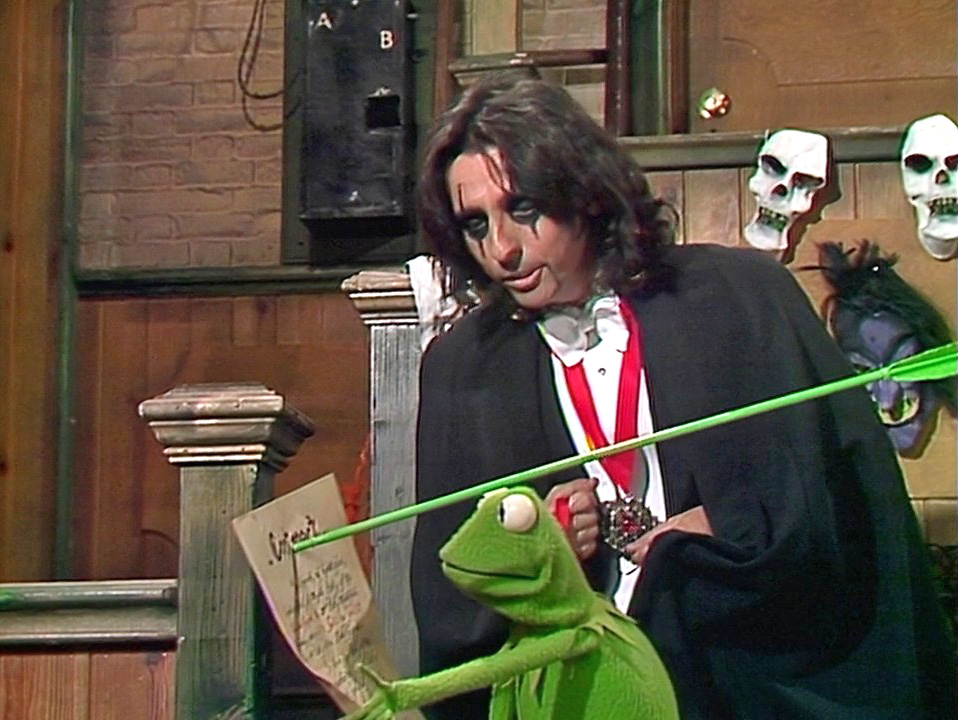I finally caught up with Sam Dunn's
Super Duper Alice Cooper,
a project I was very much looking forward to.
I had a renewed romance
with Coop some years back, enjoying his snarly clowning around in recent
offerings like Dirty Diamonds
and Brutal Planet.
 |
| "Me three, pal!" |
As
for Dunn, I've followed him ever since he glued together Metal:
A Headbanger's Journey.
Dunn's fresh-out-of-college shuck proved surprisingly effective in
disarming his subjects, from drooling fans to long-in-the-tooth rock
'n' roll survivors. “I'm an anthropologist, looking into the
anthropology of the Heavy Metal scene.” Sure, kid. Whatever you
told the National Film Board to get your funding works for me,
too.
Since
then, Dunn's movies have traded on his unabashed joy for the genre
and its artists, producing jolly, affirmational behind-the-scenes
extravaganzas like Iron
Maiden: Flight 666 and
RUSH: Beyond The
Lighted Stage.
His enthusiasm is remarkably infectious: even the notoriously
reticent Neal Peart
chuckles and opens up to Dunn's camera. Super
Duper offers
Dunn, in conversation with Alice, while the cameras roll. Could this
agreeable fanboy filmmaker entice new revelations and insights from
the Coop's thin lips?
Short answer: beyond copping to a cocaine addiction in the '80s, no.
I should point out this is something of a departure for Dunn: it's a
narrative doc, with no footage of Dunn-yacking-with-the-subject. But
the film starts promisingly enough, with Vincent Furnier and the
other original members of Alice Cooper narrating the sequence of the
band's origins, while home movies and animated photos play out
against a pastiche of vintage horror flicks, with particular emphasis
on Dr. Jeckyl & Mr Hyde. Stylistically, Dunn is borrowing
heavily from Julian Temple's The Filth & The Fury: A
Sex Pistols Film — a commendable, if dangerous choice.
Commendable because Temple's film is rousing entertainment; dangerous
because comparisons quickly reveal the weaknesses in Dunn's movie.
Super Duper
isn't the story of a band, it is the story of one man, Vincent
Furnier, and how he survived a near half-century in showbiz.
Consequently, though Dunn brings in a chorus of other voices to round
out the narrative, the predominant voice is Furnier-Cooper's — he
determines the framing of the narrative, and the others (including
ex-bandmates) pretty much fall in line with it.
Makes sense, really.
It's the formula to success that manager Shep
Gordon spotted and quckly
honed to a razor's edge and weilded in his own self-interest: “Alice Cooper”
The Persona is the meal-ticket; fence that off, and everything else
becomes negotiable.
 |
| "And that's what really happened -- just ask anyone in this room." |
Now
that would be an
interesting angle to explore. But Alice Cooper is also Dunn's
meal-ticket, so we get the expected narrative of addiction and
recovery — or more accurately, the pernicious All-American
Narrative Of Addiction And Recovery, which extolls the virtues of the
Nuclear Family closing ranks behind The Rugged Individualist,
cleaning him up and sending him back into the fray, to prove himself
(and by extension them) Victorious Conqueror Of The Scene At Large.
If Coop's version doesn't grab you, go watch Johnny Cash. Same story,
different costumes.
I don't want to come down too hard on Dunn: these films take a heap
of work, and the film I really want to watch is an almost impossible
challenge, if only because Furnier and his handlers are too vigilant
to allow it. But I'm hoping Dunn rediscovers some of his anthropology
texts soon.
What
were the social conditions that made Alice Cooper such a smash hit?
Furnier says he owes his success to being the only one doing
what he was doing when he was doing it — he saw a gap and filled it, basically. Even if we accept that claim
at face value (and I don't) why was America ready to make this guy a
superstar? When was
America ready to make him a superstar?
Answer:
1973,
with the landslide re-election of Richard
Nixon coinciding with the release of Billion Dollar Babies, Alice
Cooper's first album to go gold, and eventually platinum.
At
the time, parents (like my own) saw clips of Alice Cooper's
outrageous stage antics and thought this was the behaviour of a man
in fact possessed by demons — a curious claim at a curious time. If an
anthropologist were to do a little trawling through the
counter-cultural penny-press of that era, focusing on the
publications devoted to the occult and esoterica, he'd quickly
discover that the long-haired kids saw clips of the president
their parents had re-elected and believed this, too, was the
behaviour of a man in fact possessed by demons. Now consider how the Babies
show concluded with a roadie in a Nixon mask being beaten to an inch
of his life by the band — and an increasingly frenzied audience —
and you have a better grasp of the when behind
the why.*
 |
| "Oh, I'm just warming up." |
That's
just one of many other more interesting stories swirling in the wake
of this Addiction Recovery Success narrative, but you'll have to read
books to find 'em — starting with
What You Want Is In The Limo: On The Road With Led
Zeppelin, Alice Cooper & The Who In 1973, The Year The 60s Died &
The Modern Rock Star Was Born by
Michael Walker (A).
Pair that up with
Nixonland by
Rick Perlstein (A) and
you'll be clutching your blankets and calling for mommy faster than
you can say, “Welcome to my nightmare.”
In the meantime you can take or leave Dunn's flick for what it is: a
reverent tribute to a showbiz veteran, a nostalgic diversion.
*Another when question worth asking: when did Alice cease
to be frightening?

No comments:
Post a Comment